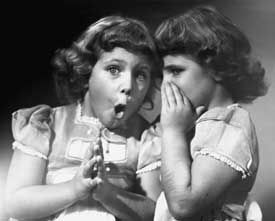Bullying
Kids Who Consider Everyone a Friend Are Less Likely to Bully
Children who overestimate popularity and number of friends are less aggressive.
Posted August 11, 2013

A new report has found that children who overestimate their popularity and consider ‘everyone a friend’ are less likely to be bullies than those who hold more accurate assessments of their social standing. The paper titled, “The Bright Side of Positive Perceptual Bias: Children’s Estimations of Network Centrality and Aggression,” will be presented on August 12, 2013 in New York City at the American Sociological Association’s 108th Annual Meeting.
The study is co-authored by Jennifer Watling Neal, an assistant professor of psychology at Michigan State University and Elise Cappella, an assistant professor of applied psychology at New York University. As Neal explains, "The more kids overestimated their popularity, the less aggression they displayed. This means that kids who were more accurate in their assessment of their number of friends or who underestimated their quantity of friends compared to peer report were more aggressive."
Previous studies have suggested that children who believe they are more popular were more likely to be aggressive. Neal and Cappella found the opposite to be true. "Our research suggests there are certain types of positive perceptual biases that have a 'bright side,'" said Neal. "When kids say they have more friends than their peers say they have, those children are actually less aggressive."
This finding was true for both “overtly” aggressive behavior like hitting, kicking, or threatening to beat up others – and also displaying “relationally” aggressive behavior such as excluding others or spreading rumors.
The Importance of Social Connectedness
The study is based on a survey of 421 second through fourth graders from five public elementary schools in an urban midwestern city. The survey was administered in individual classrooms where students were asked to identify their network friends and the friends of their peers. Students also identified the classmates they considered to be bullies.
Across the board, "children who overestimated their popularity compared to peer report were less likely to be nominated by their peers as overtly or relationally aggressive," Neal said. The researchers conclude that there could be several reasons why students who overestimate their popularity do not feel the need to bully others.

Another possible reason that students who overestimate their social connections may be nice, sociable kids is that they believe they are friends with everyone. "On the other hand, aggressive children—especially those who use forms of aggression such as rumor spreading—may be more exclusive in who they report as their friends, leading to less overestimation," Neal said.
As for why some students overestimate their social connections, Neal said, "Kids naturally vary in their ability to accurately perceive classroom social connections and their own social positions in the classroom. It's not surprising that some children think they have a lot more friends than they actually do."
Conclusion: Insecurity and Fear Fuel Aggressive Behavior
Insecurity and fear drive hatred and bullying. As a gay teen I was subjected to my fair share of bullying. Luckily, I never really felt threatened by homophobes because I knew that their hatred would ultimately eat them up inside more than it could ever undermine me. If I let their animosity roll of my back and stuck with my friends, I knew they couldn’t really hurt me.
Running and working out helped me become more resilient as a teenager, but believing that I had a strong social support network is ultimately what pulled me through those rough adolescent years. This technique has worked for me as an adult and it can work for you, too. Reaching out to your social support network is the best way to cope with bullying at any stage of life.
Unfortunately, the backstabbing, gossipy antics of our youth often play out in our adult lives. Do you have co-workers or ‘frenemies’ who talk about you behind your back and try to build themselves up by cutting you down? One of the most interesting aspects of Neal and Capella's new study is that the researchers consider the spreading of rumors to be a type of bullying that actually backfires by creating isolation and makes people less popular.
There is a growing amount of new research confirming the importance of social connectivity as it is linked to practicing loving-kindness, happiness, and health. If you’d like to read more on these topics please check out my Psychology Today blogs: “Evolution Does Not Reward Mean and Selfish People”, “Why Is Doing Good More Important Than Feeling Good”, “Prosocial Behavior Builds Social Capital and Resilience” and “Social Connectivity Drives the Engine of Well-Being”.




